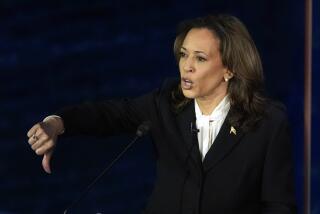Behind Power in Poland Is Heart of a Woman
WARSAW — After he won reelection in a first-round knockout, Polish President Aleksander Kwasniewski and his popular wife, Jolanta Kwasniewska, appeared at a victory rally with jubilant supporters, some of whom shouted out hopes that she will be his successor five years from now.
“The presidency in this country is democratic, not dynastic,” Kwasniewski, 45, responded at the event earlier this month, while going on to thank his wife as “a great support in difficult moments.”
Whatever the prospects of Kwasniewska making a presidential bid in 2005, when her husband will be ineligible to run again, she plays a key role in the success of Poland’s first couple. She smoothly complements the ingratiating manner and inclusive politics that have been her husband’s trademarks.
After winning the presidency in 1995, Kwasniewski, a former Communist, tried “to place himself beyond all conflicts, almost being detached from politics,” said Andrzej Rychard, chairman of the sociology department at Warsaw’s Central European University. “He quite rightly identified the state of social consciousness, that people did not like politicians and politics.
“Then he added something. His presidency is associated with Poland joining NATO, talks with the European Union, with some economic growth. I’m not saying he’s the author of all these things. But these are attractive goals which definitely are at least chronologically associated with the time of his presidency.”
Then came a political boost from the first lady. Trained in law, experienced in running a real estate firm, the mother of a teenage daughter and possessing a taste for elegant fashion, she is the favorite heroine of upscale Polish women’s magazines.
“After the [1995] election, for me it was like an earthquake,” the 45-year-old first lady said. “I woke up the next day and was in a totally different role. I had no advisors, no experience.”
Kwasniewska’s style was criticized early in the couple’s life in the Presidential Palace. When Britain’s Queen Elizabeth II visited Poland, the first lady was accused of trying to upstage the monarch by dressing in too flashy a manner. Her hairstyle was compared to that of a leading pop singer.
She toned down her image and threw her energies into charity work. “I received hundreds and hundreds of letters,” she said. “People asked me for support, especially for money: ‘Could you help with this or that problem?’ I decided to set up a foundation.”
Kwasniewska launched Communication Without Barriers, which supports hospitals and orphanages and places particular emphasis on helping children suffering from leukemia. She is active in breast cancer awareness programs and signed up to serve as a bone marrow transplant donor--although there hasn’t yet been a patient match.
Superficial similarities with First Lady Hillary Rodham Clinton are often noted--including their shared background in law, daughters of about the same age, and potential or actual political ambitions--yet Kwasniewska projects a softer image that carries well in Poland’s traditional society.
As first lady, Kwasniewska found things to do “which presented her very nicely in the media,” Rychard said. “Her activity in charity and all these things is something which people do like. She behaved in a way which I think represents for the majority of Poles the stereotype of the modern wife for the modern president.”
At a recent outdoor event to promote testing for breast cancer, Kwasniewska individually greeted everyone at the front of the crowd. In a brief speech, she urged women to check themselves regularly and have periodic medical exams. “Many women can change the history of their lives,” she said.
“She’s doing wonderful work,” said Daniela Szymanska, 59, a nurse who heard her speak. Kwasniewska represents her husband “in a very dignified way,” Szymanska added. “I think they’re a wonderful couple, a model couple.”
Kwasniewska has never shown an inclination to run for office. But a poll by the independent Social Surveys Office asking who in Poland is fit to be president indicated that it’s not a far-fetched idea. Her husband placed first, and former Foreign Minister Andrzej Olechowski, runner-up in this month’s election, was second. Kwasniewska came next.
More to Read
Sign up for Essential California
The most important California stories and recommendations in your inbox every morning.
You may occasionally receive promotional content from the Los Angeles Times.










